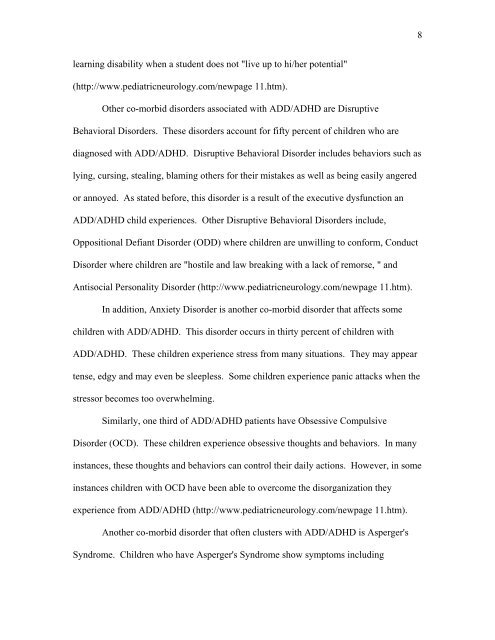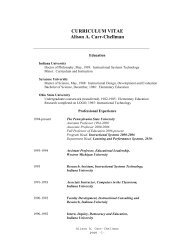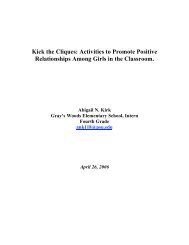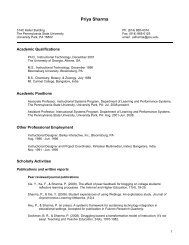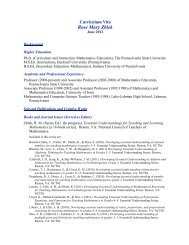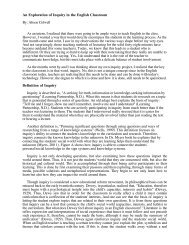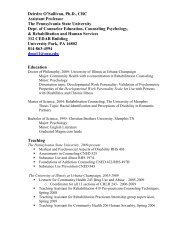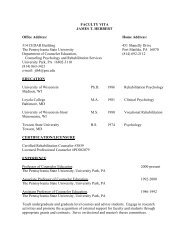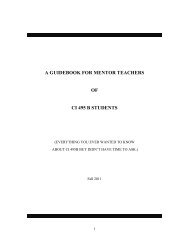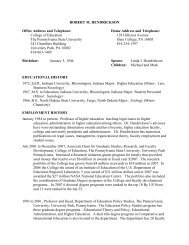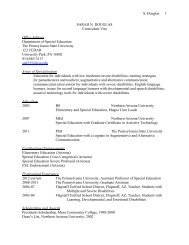Lets Focus! - the Penn State College of Education
Lets Focus! - the Penn State College of Education
Lets Focus! - the Penn State College of Education
You also want an ePaper? Increase the reach of your titles
YUMPU automatically turns print PDFs into web optimized ePapers that Google loves.
learning disability when a student does not "live up to hi/her potential"<br />
(http://www.pediatricneurology.com/newpage 11.htm).<br />
O<strong>the</strong>r co-morbid disorders associated with ADD/ADHD are Disruptive<br />
Behavioral Disorders. These disorders account for fifty percent <strong>of</strong> children who are<br />
diagnosed with ADD/ADHD. Disruptive Behavioral Disorder includes behaviors such as<br />
lying, cursing, stealing, blaming o<strong>the</strong>rs for <strong>the</strong>ir mistakes as well as being easily angered<br />
or annoyed. As stated before, this disorder is a result <strong>of</strong> <strong>the</strong> executive dysfunction an<br />
ADD/ADHD child experiences. O<strong>the</strong>r Disruptive Behavioral Disorders include,<br />
Oppositional Defiant Disorder (ODD) where children are unwilling to conform, Conduct<br />
Disorder where children are "hostile and law breaking with a lack <strong>of</strong> remorse, " and<br />
Antisocial Personality Disorder (http://www.pediatricneurology.com/newpage 11.htm).<br />
In addition, Anxiety Disorder is ano<strong>the</strong>r co-morbid disorder that affects some<br />
children with ADD/ADHD. This disorder occurs in thirty percent <strong>of</strong> children with<br />
ADD/ADHD. These children experience stress from many situations. They may appear<br />
tense, edgy and may even be sleepless. Some children experience panic attacks when <strong>the</strong><br />
stressor becomes too overwhelming.<br />
Similarly, one third <strong>of</strong> ADD/ADHD patients have Obsessive Compulsive<br />
Disorder (OCD). These children experience obsessive thoughts and behaviors. In many<br />
instances, <strong>the</strong>se thoughts and behaviors can control <strong>the</strong>ir daily actions. However, in some<br />
instances children with OCD have been able to overcome <strong>the</strong> disorganization <strong>the</strong>y<br />
experience from ADD/ADHD (http://www.pediatricneurology.com/newpage 11.htm).<br />
Ano<strong>the</strong>r co-morbid disorder that <strong>of</strong>ten clusters with ADD/ADHD is Asperger's<br />
Syndrome. Children who have Asperger's Syndrome show symptoms including<br />
8


